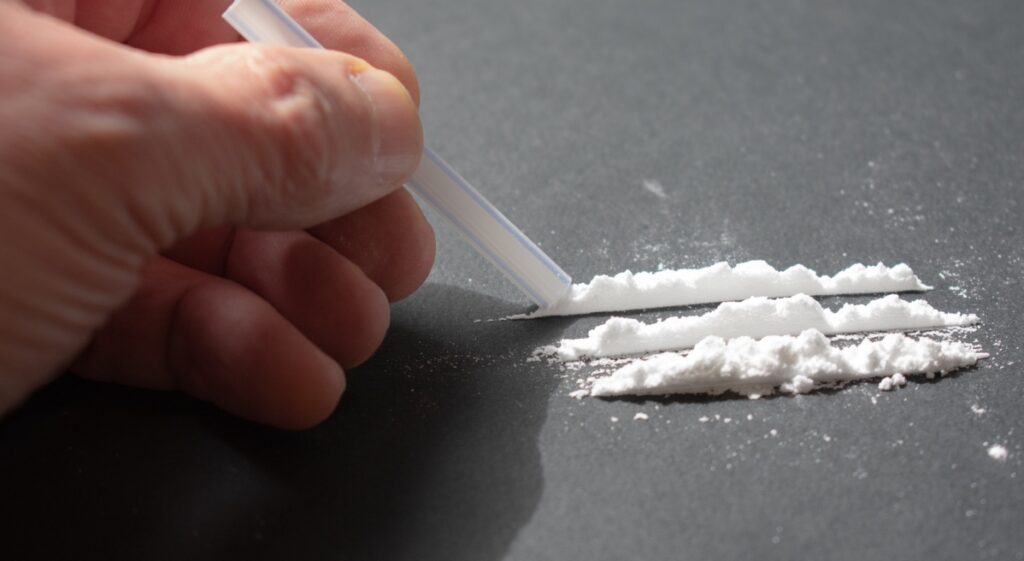Cocaine is a drug with a long history of human use. It was once a component of certain carbonated beverages and had medical applications, but today it is known how dangerous this drug is to human health, and it is classified as a prohibited psychoactive substance. Cocaine has a negative impact on the entire body, especially the heart and the brain, often leading to fatal outcomes.
Cocaine is often referred to as the “perfect drug for a heart attack” because it can easily induce a heart attack, even with the first use.
Cocaine is a white powder, easily soluble in water, and can also be in the form of a paste or rock. It is commonly snorted intranasally, can be rubbed on the gums, or dissolved in water and injected into the body with a needle. Smoking pure cocaine (crack) or in combination with other drugs is also a particularly dangerous method of cocaine use, especially for individuals with respiratory conditions.
Immediate effects of cocaine use include hyperactivity, increased blood pressure, accelerated heart rate, and euphoria. After the drug’s effects wear off, feelings of apathy, dissatisfaction, depression, and a craving for the drug may arise.
How does cocaine affect the heart?
In addition to the short-term effects of constricted blood vessels, high blood pressure, rapid heart rate, and/or irregular heartbeat, cocaine can also have long-term effects on the heart and the entire cardiovascular system.
High blood pressure:
While cocaine generally raises blood pressure for a short period after use, long-term use has the potential to permanently increase blood pressure, increasing the risk of heart problems and heart attack. Research shows that the risk to the heart exists even in young and healthy individuals who only use cocaine occasionally.
Chest pain:
Due to the chronic health effects of cocaine use, there is a greater likelihood that individuals will experience chest pain when under the influence of cocaine. The cause of the pain can be abnormalities in heart rhythm, changes in oxygen demands, heart attack, artery spasms, or cardiac infections.
Heart attack
Cocaine is often referred to as the “perfect drug for a heart attack” because it can easily induce a heart attack regardless of whether someone has used the drug once or multiple times. Not only does cocaine cause high blood pressure, but it can also lead to constriction of blood vessels, which hinders the adequate flow of blood to the heart. Cocaine can also promote blood clotting and blockage of blood vessels, which can trigger a heart attack at any time.
In case of symptoms of a heart attack, seek assistance from cardiologists and interventional cardiologists at PULSE Cardiology Center, who will provide prompt and comprehensive diagnostics and determine the appropriate treatment.
Coronary artery disease
Long-term use of cocaine potentially increases the risk of developing coronary artery disease, which causes narrowing of blood vessels due to plaque buildup. Severe cases can lead to heart and brain attacks, as well as sudden death. Cocaine can also cause the constriction of coronary arteries, limiting blood flow to the heart and resulting in heart damage.
Heart Structure Damage
Compared to non-users, it has been discovered that cocaine users have an enlargement of the left ventricle and increased stiffness of the aorta, the main blood vessel in the heart. Therefore, cocaine has the potential to directly damage the structure of the heart.
Cardiac Arrhythmias
When cocaine is consumed, the body naturally blocks the flow of potassium and sodium ions to the heart muscles, which are necessary for maintaining a regular heart rhythm. There are several types of arrhythmias that can occur, such as sinus tachycardia, ventricular fibrillation, and sinus bradycardia.
Endocarditis
Cocaine can cause inflammation or infection of the inner lining of the heart, known as endocarditis. The infection can be caused by bacteria in the bloodstream when cocaine is taken intravenously.
Congestive Heart Failure
Cocaine addicts can develop congestive heart failure over time, which is a chronic medical condition characterized by the inability of the heart muscle to effectively pump blood throughout the body.
Cocaine Impairs Blood Circulation to the Brain and Causes Stroke
Chronic cocaine use leads to the narrowing of blood vessels, reducing oxygen supply to the brain and potentially resulting in serious issues such as brain damage, aneurysms, strokes, seizures, cerebral atrophy (brain shrinkage), and cerebral vasculitis (brain inflammation).
Remarkably, 73% of individuals who experience a stroke due to cocaine addiction have no other contributing factors!
At the PULSE Cardiology Center’s Stroke Center, a team of top-notch doctors, equipped with state-of-the-art diagnostic tools, aims to swiftly diagnose strokes and promptly initiate effective treatment to prevent complications.
Mental Health
The lack of oxygen caused by narrowed blood vessels can also impair an individual’s cognitive functions, affecting their motor skills, decision-making, concentration, and long-term memory.
How does cocaine affect the body?
People who snort cocaine can experience nosebleeds, and long-term use can damage the sense of smell and even the structure of the nose. Snorting cocaine can also cause hoarseness and swallowing difficulties.
Gastrointestinal System – Cocaine can wreak havoc on the gastrointestinal system. Individuals who use cocaine experience reduced appetite, leading to weight loss and malnutrition. Cocaine use can damage the intestinal tissue (gangrene) and reduce blood flow through the intestines, resulting in stomach pain, diarrhea, and vomiting. These adverse effects can occur within an hour of use or up to 48 hours after taking it.
Endocrine System – Cocaine affects the endocrine system by disrupting hormone production and regulation. Chronic cocaine use can lead to excessive stimulation of the adrenal glands, resulting in aggression and mental health problems. Cocaine can also impact female reproductive glands, interfering with menstrual cycles and fertility. Cocaine use can decrease sperm count in males.
Immune System – Cocaine abuse can have negative effects on the immune system. Cocaine can suppress the production of immune cells or alter them, weakening the body’s immune response. Smoking crack cocaine increases the risk of bronchitis and pneumonia. Cocaine users are at a higher risk of infections such as hepatitis and HIV.




